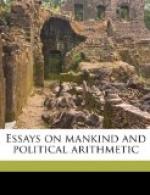6. Whether more would be gained by foreign commerce? The gain which England makes by lead, coals, the freight of shipping, &c., may be the same, for aught I see, in both cases. But the gain which is made by manufactures will be greater as the manufacture itself is greater and better. For in so vast a city manufactures will beget one another, and each manufacture will be divided into as many parts as possible, whereby the work of each artisan will be simple and easy. As, for example, in the making of a watch, if one man shall make the wheels, another the spring, another shall engrave the dial-plate, and another shall make the cases, then the watch will be better and cheaper than if the whole work be put upon any one man. And we also see that in towns, and in the streets of a great town, where all the inhabitants are almost of one trade, the commodity peculiar to those places is made better and cheaper than elsewhere. Moreover, when all sorts of manufactures are made in one place, there every ship that goeth forth can suddenly have its loading of so many several particulars and species as the port whereunto she is bound can take off. Again, when the several manufactures are made in one place, and shipped off in another, the carriage, postage, and travelling charges, will enhance the price of such manufacture, and lessen the gain upon foreign commerce. And lastly, when the imported goods are spent in the port itself, where they are landed, the carriage of the same into other places will create no further charge upon such commodity; all which particulars tend to the greater gain by foreign commerce.
7. As for arts of delight and ornament. They are best promoted by the greatest number of emulators. And it is more likely that one ingenious curious man may rather be found out amongst 4,000,000 than 400 persons. But as for husbandry, viz., tillage and pasturage, I see no reason, but the second state (when each family is charged with the culture of about twenty-four acres) will best promote the same.
8. As for lessening the fatigue of carriage and travelling.
The thing speaks for itself, for if all the men of business, and all artisans, do live within five miles of each other, and if those who live without the great city do spend only such commodities as grow where they live, then the charge of carriage and travelling could be little.
9. As to the preventing of beggars and thieves.
I do not find how the differences of the said two states should make much difference in this particular; for impotents (which are but one in about 600) ought to be maintained by the rest. 2. Those who are unable to work, through the evil education of their parents, ought (for aught I know) to be maintained by their nearest kindred, as a just punishment upon them. 3. And those who cannot find work (though able and willing to perform it), by reason of the unequal application of hands to lands, ought to be provided




